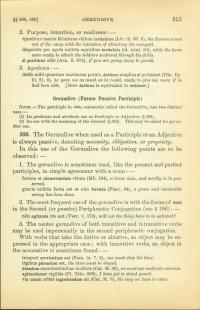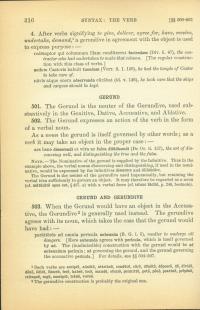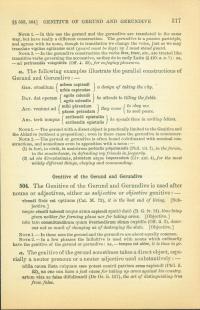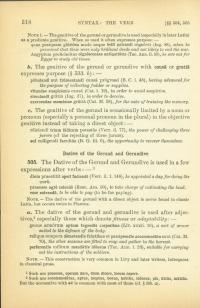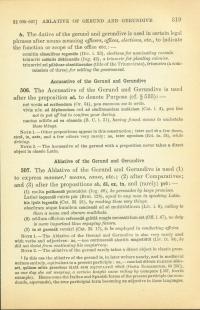Gerundive (Future Passive Participle)
500. The gerundive when used as a participle or an adjective is always passive, denoting necessity, obligation, or propriety.
In this use of the gerundive the following points are to be observed:
- The gerundive is sometimes used, like the present and perfect participles, in simple agreement with a noun.
fortem et cōnservandum virum (Mil. 104)
a brave man, and worthy to be preservedGravis iniūria facta est et nōn ferenda. (Flacc. 84)
A grave and intolerable wrong has been done. - The most frequent use of the gerundive is with the forms of esse in the 2nd (or Passive) Periphrastic Conjugation (see § 196).
Nōn agitanda rēs erit? (Verr. 5.179)
Will not the thing have to be agitated? - The neuter gerundive of both transitive and intransitive verbs may be used impersonally in the 2nd periphrastic conjugation. With verbs that take the dative or ablative, an object may be expressed in the appropriate case; with transitive verbs, an object in the accusative is sometimes found.
Temporī serviendum est. (Fam. 9.7.2)
One must obey the time.Lēgibus pārendum est. The laws must be obeyed.
ūtendum exercitātiōnibus modicīs (Cat. M. 36)
we must use moderate exerciseagitandumst vigiliās (Pl. Trin. 869)
I have got to stand guard.via quam nōbīs ingrediendum sit (Cat. M. 6)
the way we have to enter. - After verbs signifying to give, deliver, agree for, have, receive, undertake, demand,1 a Gerundive in agreement with the object is used to express purpose.
redēmptor quī columnam illam condūxerat faciendam (Div. 2.47)
the contractor who had undertaken to make that column [The regular construction with this class of verbs.]Aedem Castoris habuit tuendam. (Verr. 2.1.150)
He had the temple of Castor to take care of.Nāvīs atque onera adservanda cūrābat (id. 5.146)
He took care that the ships and cargoes should be kept.
Gerund
501. The gerund is the neuter of the gerundive, used substantively in the genitive, dative, accusative, and ablative.
502. The gerund expresses an action of the verb in the form of a verbal noun. As a noun the gerund is itself governed by other words; as a verb it may take an object in the proper case.
ars bene disserendī et vēra ac falsa dīiūdicandī (De Or. 2.157)
the art of discoursing well, and distinguishing the true and the false.
Note— The nominative of the gerund is supplied by the infinitive. Thus in the example above, the verbal nouns discoursing and distinguishing, if used in the nominative, would be expressed by the infinitives disserere and dīiūdicāre. The gerund is the neuter of the gerundive used impersonally, but retaining the verbal idea sufficiently to govern an object. It may therefore be regarded as a noun (cf. mātūrātō opus est, § 497.a) with a verbal force (cf. istanc tāctiō, § 398, footnote).
503. When the gerund would have an object in the accusative, the Gerundive2 is generally used instead. The gerundive agrees with its noun, which takes the case that the gerund would have had.
parātiōrēs ad omnia perīcula subeunda (B. G. 1.5)
readier to undergo all dangers
Here subeunda agrees with perīcula, which is itself governed by ad. The (inadmissible) construction with the gerund would be ad subeundum perīcula; ad governing the gerund, and the gerund governing the accusative perīcula] For details, see §§ 504 - 507, below.
Note 1— In this use the gerund and the gerundive are translated in the same way, but have really a different construction. The gerundive is a passive participle, and agrees with its noun, though in translation we change the voice, just as we may translate vigiliae agitandae sunt (guard must be kept) by I must stand guard.
Note 2— In the gerundive construction the verbs ūtor, fruor, etc., are treated like transitive verbs governing the accusative, as they do in early Latin (§ 410.a, Note 1)
ad perfruendās voluptātēs (Off. 1.25)
for enjoying pleasures
a. The following examples illustrate the parallel constructions of gerund and gerundive.
| GEN. | cōnsilium |
urbem capiendī |
a design of taking the city |
| DAT. | dat operam |
agrōs colendō |
he attends to tilling the fields |
| ACC. | veniunt ad |
mihi pārendum |
they come to obey me to seek peace |
| ABL. | terit tempus |
scrībendō epistulās |
he spends time in writing letters |
Note 1— The gerund with a direct object is practically limited to the genitive and the ablative (without a preposition); even in these cases the gerundive is commoner.
Note 2— The gerund or gerundive is often found co-ordinated with nominal constructions, and sometimes even in apposition with a noun.
- in forō, in cūriā in amīcōrum perīculīs prōpulsandīs (Phil. 7.7)
in the forum, in the senate-house, in defending my friends in jeopardy - ad rēs dīversissimās, pārendum atque imperandum (Liv. 21.4)
for the most widely different things, obeying and commanding
Genitive of the Gerund and Gerundive
504. The genitive of the gerund and gerundive is used after nouns or adjectives, either as Subjective or Objective Genitive.
Vīvendī fīnis est optimus. (Cat. M. 72)
It is the best end of living. [Subjective]
neque cōnsilī habendī neque arma capiendī spatiō datō (B. G. 4.14)
time being given neither for forming plans nor for taking arms [Objective]
nōn tam commūtandārum quam ēvertendārum rērum cupidōs (Off. 2.3)
desirous not so much of changing as of destroying the state [Objective.]
Note 1— In these uses the gerund and the gerundive are about equally common.
Note 2— In a few phrases the infinitive is used with nouns which ordinarily have the genitive of the gerund or gerundive.
Tempus est abīre
It is time to go.
a. The genitive of the gerund sometimes takes a direct object, especially a neuter pronoun or a neuter adjective used substantively.
Nūlla causa iūsta cuiquam esse potest contrā patriam arma capiendī. (Phil. 2.53)
No one can have a just cause for taking up arms against his country.
artem vēra ac falsa dī iūdicandī (De Or. 2.157)
the art of distinguishing true from false
Note— The genitive of the gerund or gerundive is used (especially in later Latin) as a predicate genitive. When so used it often expresses purpose.
quae postquam glōriōsa modo neque bellī patrandī cōgnōvit (Iug. 88)
when he perceived that these were only brilliant deeds and not likely to end the war
Aegyptum proficīscitur cōgnōscendae antīquitātis (Tac. Ann. 2.59)
He sets out for Egypt to study old times.
b. The genitive of the gerund or gerundive with causā or gratiā expresses purpose (§ 533.b).
pābulandī aut frūmentandīcausā prōgressī (B. C. 1.48)
having advanced for the purpose of collecting fodder or supplies
vītandae suspīcionis causā (Cat. 1.19)
in order to avoid suspicion
simulandī grātiā (Iug. 37)
in order to deceive
exercendae memōriae grātiā (Cat. M. 38)
for the sake of training the memory
c. The genitive of the gerund is occasionally limited by a noun or pronoun (especially a personal pronoun in the plural) in the Objective Genitive instead of taking a direct object.
rêiciendī trium iūdicum potestās (Verr. 2.77)
the power of challenging three jurors (of the rejecting of three jurors)
suī colligendī facultās (B. G. 3.6)
the opportunity to recover themselves
Dative of the Gerund and Gerundive
505. The dative of the gerund and gerundive is used in a few expressions after verbs.3
Diem praestitit operī faciendō.(Verr. 2.1.148)
He appointed a day for doing the work.
praeesse agrō colendō (Rosc. Am. 50)
to take charge of cultivating the land
esse solvendō to be able to pay (to be for paying)
Note— The dative of the gerund with a direct object is never found in classic Latin, but occurs twice in Plautus.
a. The Dative of the Gerund and Gerundive is used after adjectives,4 especially those which denote fitness or adaptability,
genus armōrum aptum tegendīs corporibus (Liv. 32.10)
a sort of armor suited to the defence of the body
Reliqua tempora dēmetendīs frūctibus et percipiendīs accommodāta sunt. (Cat. M. 70)
The other seasons are fitted to reap and gather in the harvest.
perferendīs mīlitum mandātīs idōneus (Tac. Ann. 1.23)
suitable for carrying out the instructions of the soldiers
Note— This construction is very common in Livy and later writers, infrequent in classical prose.
b. The Dative of the Gerund and Gerundive is used in certain legal phrases after nouns meaning officers, offices, elections, etc., to indicate the function or scope of the office etc.
comitia cōnsulibus rogandīs (Div. 1.33)
elections for nominating consuls
triumvir colōniīs dēdūcundīs (Iug. 42)
a triumvir for planting colonies
triumvirī reī pūblicae cōnstituendae (title of the Triumvirate) triumvirs (a commission of three) for settling the government
Accusative of the Gerund and Gerundive
506. The accusative of the gerund and gerundive is used after the preposition ad, to denote purpose (cf. § 533).
Mē vocās ad scrībendum. (Or. 34)
You summon me to write.
Vīvis nōn ad dēpōnendam sed ad cōnfīrmandam audāciam. (Cat. 1.4)
You live not to put off but to confirm your daring.
nactus aditūs ad ea cōnanda (B. C. 1.31)
having found means to undertake these things
Note 1— Other prepositions appear in this construction; inter and ob a few times, circā, in, ante, and a few others very rarely.
inter agendum
while driving
Note 2— The accusative of the gerund with a preposition never takes a direct object in classic Latin.
Ablative of the Gerund and Gerundive
507. The ablative of the gerund and gerundive is used (1) to express manner,5 means, cause, etc.; (2) after comparatives; and (3) after the propositions ab, dē, ex, in, and (rarely) prō.
- Multa pollicendō persuādet. (Iug. 46)
He persuades by large promises.Latīnē loquendō cuivīs pār (Brut. 128)
equal to any man in speaking Latinhīs ipsīs legendīs (Cat. M. 21)
by reading these very thingsobscūram atque humilem conciendōad sē multitūdinem (Liv. 1.8)
calling to them a mean and obscure multitude - Nūllum officium referendā grātiā magis necessārium est. (Off. 1.47)
No duty is more important than repaying favors. - in rē gerendāversārī (Cat. M. 17)
to be employed in conducting affairsNote 1— The ablative of the gerund and gerundive is also very rarely used with verbs and adjectives.
nec continuandō abstitit magistrātū (Liv. 9.34)
He did not desist from continuing his magistracy.Note 2— The ablative of the gerund rarely takes a direct object in classic prose.
Footnotes
2.The gerundive construction is probably the original one.
3. Such are praeesse, operam dare, diem dīcere, locum capere.
4. Such are accommodātus, aptus, ineptus, bonus, habilis, idōneus, pār, ūtilis, inūtilis. But the accusative with ad is common with most of these (cf. § 385.a).
5. In this use the ablative of the gerund is, in later writers nearly, and in mediæval writers entirely, equivalent to a present participle.
Cum ūnā diērum FLENDŌ sēdisset, quīdam mīles generōsus iūxtā eam EQUITANDŌ vēnit. (Gesta Romanorum, 66 [58]) As one day she sat weeping, a certain knight came riding by (compare § 507, fourth example).
Hence come the Italian and Spanish forms of the present participle (as mandando, esperando), the true participial form becoming an adjective in those languages.

